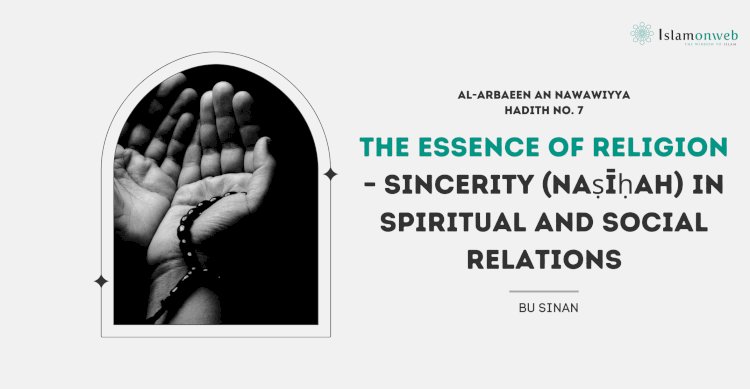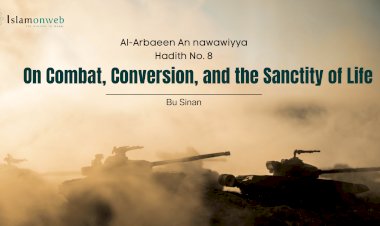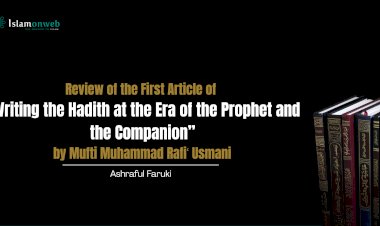Hadith No. 7 : The Essence of Religion – Sincerity (Naṣīḥah) in Spiritual and Social Relations
**عَنْ أَبِيْ رُقَيَّةَ تَمِيْم بْنِ أَوْسٍ الدَّارِيِّ رضي الله عنه أَنَّ النبي ﷺ قَالَ:
(الدِّيْنُ النَّصِيْحَةُ) قُلْنَا: لِمَنْ يَا رَسُولَ اللهِ؟ قَالَ: (للهِ، ولكتابه، ولِرَسُوْلِهِ، وَلأَئِمَّةِ المُسْلِمِيْنَ، وَعَامَّتِهِمْ)
رواه مسلم
Translation:
It is narrated from Abū Ruqayyah Tamīm ibn Aws ad-Dārī (رضي الله عنه) that the Prophet ﷺ said:
"The religion is naṣīḥah (sincerity and goodwill)."
We said, "To whom, O Messenger of Allah?"
He replied: "To Allah, His Book, His Messenger, the leaders of the Muslims, and their common folk."
(Narrated by Muslim, 55)
Abū Ruqayyah Tamīm ibn Aws ad-Dārī (رضي الله عنه)
Abū Ruqayyah Tamīm ibn Aws ibn Ḥārithah (or Khārijah ibn Sūd, or Sūwād ibn Jadhīmah ibn Darrā‘ ibn ‘Adī ibn al-Dār) ad-Dārī al-Qaḥṭānī. He was called ad-Dārī after one of his ancestors and was also known as ad-Dayrī, as he used to worship in a monastery before embracing Islam.
Tamīm ad-Dārī (رضي الله عنه) was originally a Christian monk and later embraced Islam when he arrived in Madinah. He converted in the 9th year of Hijrah along with his brother Na‘īm ibn Aws. His acceptance of Islam was significant because he narrated a unique story about al-Jassāsah and the Dajjāl, which he had encountered while at sea. The Prophet ﷺ himself recounted this story from the minbar, making Tamīm (رضي الله عنه) the only Companion whose narration was publicly affirmed by the Prophet ﷺ in a sermon.
Tamīm ad-Dārī (رضي الله عنه) was known for his deep devotion and acts of worship. He was described as “the monk of his time and the worshipper of Palestine.” He was also the first to introduce lighting lamps in the mosque, a practice which the Prophet ﷺ appreciated, stating,
"You have illuminated our mosque; may Allah illuminate your life."
During the caliphate of ʿUmar ibn al-Khaṭṭāb (رضي الله عنه), he was given permission to deliver public sermons (qaṣṣ) in the mosque, making him the first person to do so in an official capacity.
It’s reported by Baihaqi, Abu Dawud Tamīm (رضي الله عنه) was once visited by a traveller sent by ʿUmar (رضي الله عنه) with instructions: "Go and stay with the best person in Madinah." The man stayed with Tamīm (رضي الله عنه). During his stay, a fire broke out in al-Ḥarrah (a volcanic region of Madinah). ʿUmar (رضي الله عنه) summoned Tamīm (رضي الله عنه) and instructed him to confront the fire. He humbled himself and then went toward it, pushing it back into the place from where it had emerged, entering with it, and emerging unharmed.
Tamīm (رضي الله عنه) narrated 18 hadiths. He was a man of deep spirituality, a lover of the Qur’an.He continued his devotion to worship, known for his long night prayers, once reciting the verse:
{ أَمْ حَسِبَ ٱلَّذِينَ ٱجْتَرَحُواْ ٱلسَّيِّـَٔاتِ أَن نَّجْعَلَهُمْ كَٱلَّذِينَ ءَامَنُواْ وَعَمِلُواْ ٱلصَّٰلِحَٰتِ سَوَآءً مَّحْيَاهُمْ وَمَمَاتُهُمْ ۚ سَآءَ مَا يَحْكُمُونَ}
"Do those who commit sins think that We will treat them like those who believe and do righteous deeds?" (Al-Jāthiyah 45:21) He repeated it throughout the night until dawn.
After the assassination of ʿUthmān ibn ʿAffān (رضي الله عنه), Tamīm (رضي الله عنه) migrated to Palestine and settled in the region. The Prophet ﷺ had granted him a village in Palestine, and he later lived in Bayt Jibrīn, a town near al-Khalīl (Hebron). He passed away in the year 40 AH and was buried there.
Hadith Explanation:
Meaning and Significance of Naṣīḥah
The term (النصيحة) derives from نصح and carries both linguistic and Islamic (Shar‘ī) meanings. It is a fundamental concept in Islam, encapsulating sincerity, well-wishing, and guidance free from deceit.
The word naṣīḥah is rooted in the verb نصح, which signifies:
- Purity and sincerity: "نصحتُ له القول والعمل" means "I made my speech and actions sincere for him."
- Filtering and refining: "نصحتُ العسل" means "I purified the honey from its wax." Here, sincerity in advice is compared to extracting pure honey, free from impurities.
- Sewing and mending: "النَّصح" (with a fatḥah on the nūn) refers to stitching or repairing fabric. The needle (المنصحة) and thread (النِّصاح) work to close gaps, just as a sincere advisor helps mend flaws and guide others toward righteousness.
Thus, naṣīḥah metaphorically implies removing defects and ensuring sincere relationships, whether in speech, action, or relationships.
In Islamic terminology, Imam Ibn Hajar Al-Haytami defines naṣīḥah as:
"Sincere counsel that is free from deception, given with the intent of benefitting the advised individual and prioritizing their well-being over any personal gain."
This definition highlights two key elements:
- Ikhlāṣ (Sincerity): The advice must be genuine and free from selfish motives.
- Concern for the advised person: The advisor should prioritise the recipient’s welfare, whether in religious or worldly matters.
Scholars highlight that the word naṣīḥah is one of the most comprehensive words in Arabic, akin to the term "falāḥ" which denotes ‘success’ in encompassing both worldly and Hereafter prosperity.
The hadith "الدِّينُ النَّصِيحَةُ" (Religion is sincerity) shows that naṣīḥah is synonymous with Islam itself, implying that Sincerity is the foundation of faith and social interactions. Thus, naṣīḥah is the pillar of Islamic ethics, ensuring purity and sincerity in faith, relationships, and governance. Without it, religious observance becomes ritualistic and mechanical, devoid of true spirit and essence, and its true transformative power is lost.
When sincerity (ikhlāṣ) in our relationship with Allah is lost, worship becomes mere movements without devotion. When sincerity in dealings with people is abandoned, interactions become transactions, lacking genuine care and concern. The core of dīn is thus not just outward practices but an inward reality—a state of purity in intentions and actions. If the spirit of naṣīḥah disappears, faith turns into formality, existing only in letters but lacking its essence; acts of worship become habits rather than spiritual connections; religious leadership degenerates into power and politics rather than sincere guidance, and society becomes fragmented, as relationships lose the glue of trust and goodwill.
The remaining part of the hadith further explains the sincerity towards whom?:
We said, "To whom, O Messenger of Allah?"
He replied: "To Allah, His Book, His Messenger, the leaders of the Muslims, and their common folk."
The structure of the hadith shows the wisdom of the Prophet ﷺ in teaching. When he stated, “Religion is sincerity”, the Companions eagerly asked, “To whom?” This method highlights an important pedagogical principle: A teacher should sometimes withhold further explanation to allow curiosity to arise in the learner. This curiosity enhances engagement and makes the knowledge more impactful.
The Prophet ﷺ’s response then provided a gradual, comprehensive explanation of religious sincerity, covering all its aspects.
Understanding "Naṣīḥah" to Allah
The hadith explains that one of the fundamental obligations of a believer is naṣīḥah to Allah. Naṣīḥah to Allah does not mean that Allah needs advice, for He is free of all needs. Instead, it refers to the believer’s sincere devotion, loyalty, and obedience to Allah.
Naṣīḥah to Allah includes belief in His Oneness (Tawḥīd) and the rejection of all forms of shirk (associating partners with Him). It requires complete purity in worship (Ikhlāṣ), ensuring that no act of devotion is performed for show or worldly gain. True sincerity in faith is demonstrated by affirming Allah’s Divine Attributes (Ṣifāt) as described in the Qur’an and Sunnah, without distortion (taḥrīf), denial (ta‘ṭīl), or comparison (tashbīh). A believer must recognise Allah’s absolute perfection and acknowledge that He is free from all deficiencies.
Obedience to Allah’s commands is a fundamental aspect of sincerity. This includes fulfilling all obligations that He has prescribed and avoiding everything that He has forbidden. True sincerity also entails love and loyalty for the sake of Allah, meaning that one must love what Allah loves and detest what He dislikes, aligning one's will with His divine will. A sincere believer recognises Allah’s countless blessings and expresses gratitude by being constantly mindful of His favours. Submission to Allah requires humility and a complete surrender to His decrees, acknowledging His wisdom and authority over all matters.
Additionally, Calling others to Allah is an essential part of naṣīḥah. A believer should encourage people to recognise and worship Allah alone, teaching and spreading His message with sincerity. To sum up, naṣīḥah to Allah means being sincere in our relationship and connection with Him. In a hadith Qudsi, Allah himself beautifully explains how he responds to our sincerity towards him.
The Prophet ﷺ said that Allah (ﷻ) said:
"I am as My servant thinks of Me, and I am with him when he remembers Me. If he remembers Me to himself, I remember him to Myself. If he mentions Me in a gathering, I mention him in a gathering better than it. If he draws near to Me by a handspan, I draw near to him by an arm’s length. If he comes closer to Me by an arm’s length, I come closer to him by a fathom’s length. And if he comes to Me walking, I come to him running."
(Narrated by Al-Bukhārī and Muslim)
This hadith highlights Allah’s mercy, love, and responsiveness to His sincere servants, emphasising that when a believer seeks Allah with sincerity (naṣīḥah), Allah reciprocates with even greater closeness and care.
Naṣīḥah to the Book of Allah
Naṣīḥah to the Book of Allah refers to having a sincere and reverent relationship with His divine revelation. This applies to all scriptures revealed by Allah, but particularly to the Qur’an, which is His final and preserved message.
Sincerity to the Qur’an begins with the firm belief that it is the unaltered word of Allah, incomparable to any human speech. It requires the conviction that no one can ever produce even the shortest surah like it, affirming its divine origin and miraculous nature.
A believer must recite the Qur’an with proper reverence and attention, ensuring that it is read with humility, reflection, and adherence to the correct recitation (tajwīd) as preserved by the scholars of Qur’anic recitation. This sincerity extends to defending the Qur’an from misinterpretation, distortion, or attacks by critics. It involves believing in everything it contains, accepting its rulings without hesitation, and upholding its guidance in all aspects of life.
Furthermore, true sincerity to the Qur’an involves deep engagement with its meanings, understanding its parables, wisdom, and lessons, studying its rulings, reflecting on its marvels, pondering its guidance and acting upon its commands and teachings. A sincere relationship with the Qur’an also involves sharing its knowledge, spreading its wisdom, and encouraging others to seek its guidance.
It is all about our sincere and regular connection with the Quran. The Prophet ﷺ emphasised constant engagement with the Qur’an by urging the believers to revise it regularly. He ﷺ said:
"تَعَاهَدُوا هَذَا الْقُرْآنَ، فَوَالَّذِي نَفْسُ مُحَمَّدٍ بِيَدِهِ، لَهُوَ أَشَدُّ تَفَلُّتًا مِنَ الْإِبِلِ فِي عُقُلِهَا."
("Be committed to (revising) this Qur’an, for by the One in Whose Hand is the soul of Muhammad, it slips away faster than a camel from its tying ropes.")
(Agreed upon by Al-Bukhārī and Muslims)
Allah says: "وَلَقَدْ يَسَّرْنَا الْقُرْآنَ لِلذِّكْرِ فَهَلْ مِن مُّدَّكِرٍ" (And We have certainly made the Qur’an easy for remembrance, so is there anyone who will remember?) [Al-Qamar 54:17], emphasising that the Qur’an is accessible for those who sincerely seek its guidance.
Naṣīḥah to the Messenger of Allah ﷺ
Naṣīḥah (sincerity) to the Messenger of Allah ﷺ is an essential part of faith, requiring complete belief in his prophethood, obedience to his commands, and deep love and respect for his legacy. It begins with the firm belief that he is the final Messenger and that everything he conveyed is true. This sincerity manifests through obedience to his teachings in both commands and prohibitions, ensuring that his Sunnah is followed in all aspects of life. Supporting his religion, defending Islam during his lifetime and after, and spreading his message are also key aspects of naṣīḥah.
True sincerity entails love and loyalty, loving him above all others, befriending those who uphold his teachings, and distancing from those who oppose him. It also includes honouring and respecting his status, ensuring that his words and actions are treated with the highest regard. Reviving his Sunnah by practicing, spreading, and defending it from distortions is a duty upon every sincere believer. This requires deep understanding of his teachings, studying them carefully while avoiding speculation without knowledge.
Additionally, sincerity to the Prophet ﷺ means encouraging others to follow him with wisdom and kindness, ensuring that his teachings remain a guiding light. Loving his family (Ahl al-Bayt) and Companions (Ṣaḥābah) is also part of this sincerity, avoiding any disrespect or innovation that contradicts his path.
The Prophet ﷺ's love for his Ummah was unmatched, as he dedicated his life to guiding them, constantly prayed for their forgiveness, and even longed to meet those who would come after him.
The Prophet ﷺ emphasized his deep care for his followers when he said: "مَا مِنْ مُؤْمِنٍ إِلَّا أَنَا أَوْلَى بِهِ فِي الدُّنْيَا وَالْآخِرَةِ" (There is no believer except that I am closer to him than he is to himself in this world and the Hereafter.) He then recited, "النَّبِيُّ أَوْلَى بِالْمُؤْمِنِينَ مِنْ أَنْفُسِهِمْ" (The Prophet is closer to the believers than their own selves.) [Ṣaḥīḥ Muslim]. Then the Prophet ﷺ added: "فَأَيُّمَا مُؤْمِنٍ مَاتَ وَتَرَكَ مَالًا فَلْيَرِثْهُ عَصَبَتُهُ، وَمَنْ تَرَكَ دَيْنًا أَوْ ضَيَاعًا فَلْيَأْتِنِي فَأَنَا مَوْلَاهُ" (If any believer passes away leaving behind wealth, let his relatives inherit it. But if he leaves behind debt or dependents in need, let them come to me, for I am his guardian.) [Ṣaḥīḥ Muslim]. This shows the Prophet’s compassion and responsibility for his followers, further emphasizing why we should reciprocate this by showing sincerity, love, and complete adherence to his Sunnah.
Allah describes the Messenger’s deep care and concern for his followers:
{لَقَدْ جَاءكُمْ رَسُولٌ مِّنْ أَنفُسِكُمْ عَزِيزٌ عَلَيْهِ مَا عَنِتُّمْ حَرِيصٌ عَلَيْكُمْ بِالْمُؤْمِنِينَ رَؤُوفٌ رَّحِيمٌ}
(There has certainly come to you a Messenger from among yourselves. Grievous to him is what you suffer; he is deeply concerned for you and to the believers, he is kind and merciful.) [At-Tawbah 9:128]
The Prophet ﷺ, out of his immense mercy, prayed for the forgiveness of his entire Ummah in every salah. Not only did the Prophet ﷺ love those who lived during his time, but he also expressed deep longing for those who would believe in him without ever having seen him.
Anas ibn Mālik (رضي الله عنه) narrated that the Prophet ﷺ said:
"I wish that I could meet my brothers."
His Companions asked: "Are we not your brothers, O Messenger of Allah?"
He replied: "You are my Companions, but my brothers are those who will believe in me without having seen me." (Narrated by Aḥmad and Ṭabarānī)
This hadith is a powerful testament to the love and connection the Prophet ﷺ has with every believer, even those who came generations after him. Naṣīḥah to him requires that we reciprocate this love by loving him back, following his guidance, defending his personality and his Sunnah.
The Prophet ﷺ said: "لا يؤمن أحدكم حتى أكون أحبَّ إليه من ولده ووالده والناس أجمعين" (None of you truly believes until I am more beloved to him than his child, his parent, and all people.) [Ṣaḥīḥ al-Bukhārī and Muslim].
True sincerity to the Prophet ﷺ requires prioritizing his love over all worldly attachments and recognizing that his guidance is the key to success in both this life and the Hereafter.
Naṣīḥah to the Leaders of the Muslims
Naṣīḥah (sincerity) to the leaders of the Muslims, as emphasised in the hadith "الدِّينُ النَّصِيحَةُ" (Religion is sincerity), involves sincere support, responsible obedience, and wise counsel to both political and religious authorities. Sincerity toward political rulers requires obeying them in matters of righteousness, such as praying behind them, participating in legitimate efforts that serve the ummah, and fulfilling financial obligations like zakāt if they are just. However, obedience is not absolute; it applies only to matters aligned with Islamic principles. Islam discourages rebellion against rulers, even if they are unjust, unless they commit clear disbelief (كفر بواح). Instead, believers are encouraged to practice patience, make du‘ā for their guidance and righteousness, and engage in peaceful, constructive advice. Advising rulers should be done wisely and respectfully, avoiding public defamation that may incite rebellion. Additionally, sincerity demands that they be informed of societal needs they may be unaware of, ensuring justice and the well-being of the people. However, it also warns against excessive flattery and false praise, which can mislead leaders from recognising their responsibilities.
Allah commands believers to obey those in authority, as long as it aligns with Islamic teachings:
{يَا أَيُّهَا الَّذِينَ آمَنُوا أَطِيعُوا اللَّهَ وَأَطِيعُوا الرَّسُولَ وَأُولِي الْأَمْرِ مِنْكُمْ}
(O you who believe! Obey Allah, obey the Messenger, and those in authority among you.) [An-Nisā’ 4:59]
The Prophet ﷺ clarified that leadership should be followed in righteousness but not in oppression:
عَنْ عَبْدِ اللَّهِ بْنِ عُمَرَ، عَنِ النَّبِيِّ ﷺ قَالَ: السَّمْعُ وَالطَّاعَةُ عَلَى الْمَرْءِ الْمُسْلِمِ فِيمَا أَحَبَّ وَكَرِهَ، مَا لَمْ يُؤْمَرْ بِمَعْصِيَةٍ، فَإِذَا أُمِرَ بِمَعْصِيَةٍ فَلَا سَمْعَ وَلَا طَاعَةَ.
(Listening and obeying the leader is an obligation upon a Muslim, whether he likes it or dislikes it, as long as he is not commanded to commit sin. If he is ordered to commit sin, then there is no listening and no obedience.)
[Ṣaḥīḥ al-Bukhārī, 7144; Ṣaḥīḥ Muslim, 1839]
Similarly, sincerity to scholars involves respecting and valuing their knowledge, as they are the inheritors of prophetic wisdom. This includes accepting their teachings in matters of authentic knowledge, following their guidance on religious and ethical issues, and maintaining good thoughts about them.
The Prophet ﷺ said about them: (Indeed, the scholars are the inheritors of the Prophets. The Prophets do not leave behind gold or silver; rather, they leave behind knowledge. Whoever takes it has taken an abundant share.) [Sunan Abī Dāwūd, 3641]
Naṣīḥah to political and scholarly leaders is about balancing obedience with accountability and maintaining societal stability while ensuring justice and truth. It requires cooperation in good, patience in trials, and sincerity in guidance to foster a community based on trust, wisdom, and adherence to Islamic principles.
Naṣīḥah to the Fellow Muslims
The final aspect of naṣīḥah, as mentioned in this hadith, is sincerity toward the general body of Muslims. This encompasses guiding them toward what benefits them in their religious and worldly affairs, assisting them through words and actions, and upholding their rights and well-being.
Sincerity to fellow Muslims includes advising them with wisdom, encouraging them in righteousness, and protecting their dignity by concealing their faults instead of exposing them. It involves helping them in times of need, removing harm from them and bringing them benefits, as well as upholding the principle of enjoining good and forbidding evil in a manner that aligns with Islamic ethics. Furthermore, it requires respecting elders, showing mercy to the young, and offering sincere counsel with kindness and wisdom.
A sincere Muslim avoids deception, envy, and betrayal and instead wishes for others what they wish for themselves, as taught by the Prophet ﷺ: "None of you truly believes until he loves for his brother what he loves for himself." (Ṣaḥīḥ al-Bukhārī and Muslim).
Naṣīḥah also includes defending the wealth, honour, and dignity of fellow Muslims, ensuring that they are not wronged or oppressed. It extends to promoting good character, kindness, and uprightness in dealings, following the example of the righteous predecessors, some of whom prioritised sincerity toward others even at the expense of their own worldly comfort.
Describing the connection between the believers, the Prophet ﷺ said:
"حق المسلم على المسلم ست: إذا لقيته فسلِّم عليه، وإذا دعاك فأجبه، وإذا استنصحك فانصح له، وإذا عطس فحمد الله فشمِّته، وإذا مرض فعده، وإذا مات فاتبعه."
(The rights of a Muslim upon another Muslim are six: If you meet him, greet him with peace; if he invites you, accept his invitation; if he seeks your advice, give him sincere counsel; if he sneezes and praises Allah, respond with supplication; if he falls ill, visit him; and if he dies, follow his funeral.) (Narrated by Muslim, 2162)
Imam Al-Haytami explains that the early righteous scholars (السلف الصالح) emphasised that true naṣīḥah should be given privately rather than in public in order to preserve dignity and encourage acceptance. It is said: "Whoever advises his brother privately, it is sincere counsel; but whoever advises him in public, he has merely exposed and humiliated him."
Al-Fuḍayl ibn ʿIyāḍ (رحمه الله) further reinforced this principle, saying:
"The believer conceals and advises, while the wicked person exposes and dishonors."
This highlights the distinction between true sincerity and public embarrassment. A sincere person seeks to correct and uplift his fellow Muslim, whereas an insincere critic often intends to humiliate and degrade.
Naṣīḥah, in its particular meaning of advice, may be an individual obligation (farḍ ʿayn) or a collective duty (farḍ kifāyah), depending on the situation:
- It is individually obligatory (farḍ ʿayn) when a person is directly witnessing wrongdoing, and no one else is in a position to correct it.
- It is a collective obligation (farḍ kifāyah) when the responsibility can be fulfilled by others within the community, lifting the duty from individuals.
The obligation of giving naṣīḥah depends on the condition that it must not result in personal harm to the one giving the advice—whether physical, financial, or otherwise. Acceptance of the advice is not a condition for its obligation. One must still enjoin what is right and forbid what is wrong, even if the recipient rejects it.
In essence, naṣīḥah to the general Muslim community is about building sincere relationships between them, fostering a spirit of love, unity, and mutual support, and ensuring that every believer works toward the collective well-being of the ummah.
The hadith "الدِّينُ النَّصِيحَةُ" (Religion is sincerity) highlights that naṣīḥah is the foundation of faith, shaping one’s relationship with Allah, His Book, His Messenger ﷺ, Muslim leaders, and the general community. True naṣīḥah means deep devotion to Allah, adherence to His Book, unconditional love and obedience to the Prophet ﷺ, responsible engagement with leaders, and genuine care for fellow Muslims.
Disclaimer
The views expressed in this article are the author’s own and do not necessarily mirror Islamonweb’s editorial stance.
























Leave A Comment